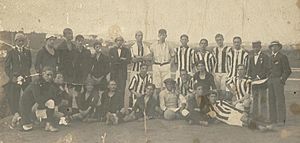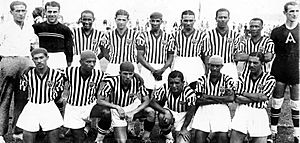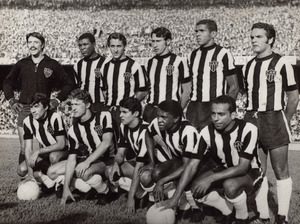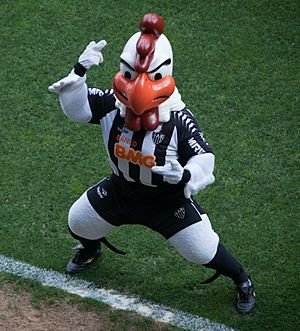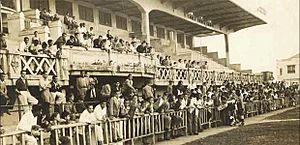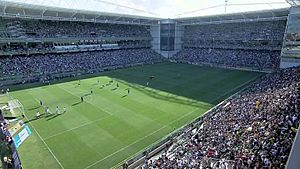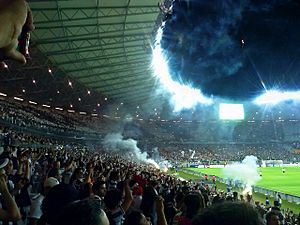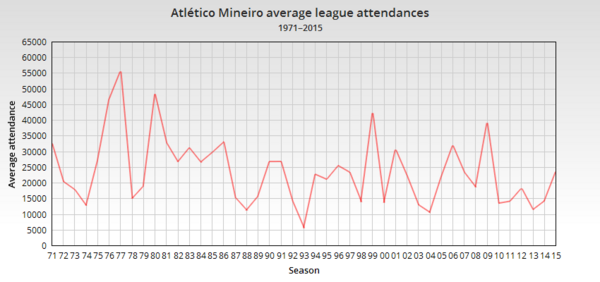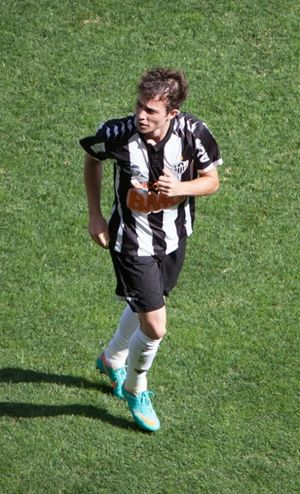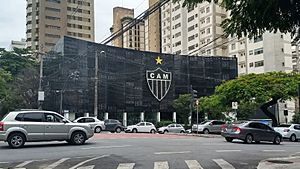Clube Atlético Mineiro facts for kids
 |
||||
| Full name | Clube Atlético Mineiro | |||
|---|---|---|---|---|
| Nickname(s) | Galo (Rooster) Galo Forte Vingador (The Strong and Victorious Rooster)(The comeback club) |
|||
| Short name | Atlético-MG CAM |
|||
| Founded | 25 March 1908 (as Athletico Mineiro Foot-Ball Club) | |||
| Ground | Arena MRV | |||
| Capacity | 46,000 | |||
| SAF Owner | Galo Holding (75%) | |||
| President | Sérgio Coelho | |||
| Head coach | Cuca | |||
| League | Campeonato Brasileiro Série A Campeonato Mineiro |
|||
| 2022 2022 |
Série A, 7th of 20 Mineiro, 1st of 12 (champions) |
|||
|
||||
The Clube Atlético Mineiro, often called Atlético Mineiro or just Galo (which means "Rooster" in Portuguese), is a professional football club. It is based in Belo Horizonte, the capital city of Minas Gerais, Brazil. The team plays in the Campeonato Brasileiro Série A, which is the top football league in Brazil.
Atlético Mineiro was started on March 25, 1908, by 22 students in Belo Horizonte. Even though its founders were from wealthy families, the club welcomed players from all backgrounds. The club's mascot, a rooster, became popular in the 1930s. This is why the team is often called "Galo." The team's home uniform is black and white striped shirts, black shorts, and white socks.
Atlético has won the Campeonato Mineiro (state league) a record 50 times. Nationally, they have won the Campeonato Brasileiro Série A three times (in 1937, 1971, and 2021). They also won the Copa do Brasil twice, the Supercopa do Brasil once, and the Copa dos Campeões da Copa Brasil once. In international club football, Atlético has won the Copa Libertadores and the Recopa Sudamericana once each. They also won the Copa CONMEBOL twice, which is a record. The club has also played in other sports, with its futsal (indoor football) team being very successful.
The club plays its home games at the Arena MRV. This stadium can hold over 46,000 fans. Construction for Arena MRV began in April 2020 and it opened in April 2023. The first official match there was in August 2023. Atlético has a big local rivalry with Cruzeiro, known as the Clássico Mineiro. They also have rivalries with América Mineiro and Flamengo. Atlético is one of the most valuable football brands in Brazil. In November 2023, Galo Holding bought 75% of the club's ownership.
Contents
Club History and Achievements
Early Years and First Trophies (1908–1949)
Clube Atlético Mineiro was founded on March 25, 1908. Its first name was Athletico Mineiro Foot Ball Club. The club's first game was on March 21, 1909, against Sport Club Futebol. Atlético won 3–0. In 1913, the club's name officially changed to Clube Atlético Mineiro. The next year, they won the Taça Bueno Brandão, their first ever trophy. In 1915, they won the first Campeonato Mineiro, which is the state league of Minas Gerais.
Atlético won the state league again in 1926. In 1927, three great forwards, Mário de Castro, Said, and Jairo, formed a famous attacking group called the Trio Maldito ("Unholy Trio"). They helped Atlético win another state league title. In 1929, the club played its first international game against Vitória de Setúbal from Portugal, winning 3–1. This game was played at the Estádio Presidente Antônio Carlos, which became the club's home for the next 20 years.
Atlético won the state league in 1931 and 1932. In 1933, they became a professional club. After winning the Campeonato Mineiro in 1936, Atlético won the first ever national league, the 1937 Campeonato Brasileiro. This competition was for state champions. Atlético won the final match 5–1. Guará was a top player during this time. The club won two more Campeonato Mineiro titles in 1938 and 1939.
Success continued in the 1940s with players like Carlyle, Lucas Miranda, Nívio, and goalkeeper Kafunga. Atlético won the state league in 1941, 1942, 1946, 1947, and 1949. A new rivalry began with Cruzeiro in the 1940s, as they became Atlético's main competitor.
The Mineirão Era and "Ice Champions" (1950–1969)
In 1950, the club moved to a new, bigger stadium called Estádio Independência. That year, they won another Campeonato Mineiro. They also went on their first European tour, playing ten games in five countries. This tour was important because there were no regular national or continental competitions in Brazil at the time. Atlético's good results, even in bad weather and snow, were seen as a big achievement for Brazilian football. The team was nicknamed the Campeões do Gelo ("Ice Champions"). This name is still remembered in the club's official song.
Atlético continued to win the state competition in the 1950s. They won five Campeonato Mineiro titles in a row from 1952 to 1956. After another state league title in 1958, Atlético played in the first Taça Brasil in 1959. This was Brazil's first yearly national competition.
In the 1960s, Atlético won the Campeonato Mineiro in 1962 and 1963. The new Mineirão stadium opened in Belo Horizonte in 1965 and became the club's new home. In the mid-1960s, the rivalry with Cruzeiro became the biggest in the state. Atlético also played well in friendly matches against national teams. In 1968, Atlético, playing as the Brazilian national team, beat Yugoslavia 3–2. The next year, they beat the actual Brazilian national team (who would win the 1970 FIFA World Cup) 2–1.
National Triumphs and State Dominance (1970–1989)
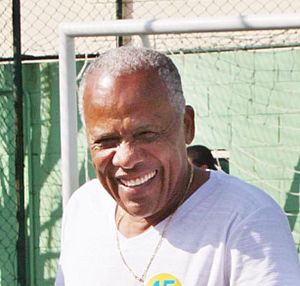
With Telê Santana as coach in 1970, Galo won its first state league title at the Mineirão. In 1971, Atlético won the Campeonato Brasileiro. This was the first edition of the new national championship. Dario was the league's top goalscorer. Atlético won the final group stage games against São Paulo and Botafogo, both 1–0. This win also allowed them to play in their first international competition, the 1972 Copa Libertadores.
After four years without trophies, Atlético won the state league again in 1976. Many talented young players came from the club's youth teams, including Reinaldo, Toninho Cerezo, Éder, Luizinho, Paulo Isidoro, and João Leite. These players helped Atlético win six state league titles in a row from 1978 to 1983. They also had good results in the national league. Atlético finished second in the 1977 Brasileirão, losing the final on penalties. Reinaldo, the top scorer that season, was not allowed to play in the final.
In 1978, Atlético reached the Copa Libertadores semi-finals. They also won the Copa dos Campeões Brasileiros, a tournament for past national champions. In 1980, Atlético lost to Flamengo in a controversial national final. Three Atlético players were sent off. In the 1981 Copa Libertadores, they were eliminated in another controversial match against Flamengo, where five Atlético players were sent off.
During the 1980s, Atlético won international friendly tournaments like the Amsterdam Tournament and the Tournoi de Paris. Atlético had the best league records in several Brasileirão seasons (1980, 1983, 1985, 1986, and 1987). However, they did not win the title, often losing in the finals or semi-finals. They continued to win the Campeonato Mineiro in 1985, 1986, 1988, and 1989. Atlético was one of Brazil's top teams in the 1980s, providing many players to the national team.
International Success and Challenges (1990–2009)
In the 1990s, Atlético won the state league in 1991. They achieved their first international success in 1992, winning the first ever Copa CONMEBOL. They beat Club Olimpia from Paraguay in the finals. As champions, they played in the 1993 Copa de Oro, where they lost to Boca Juniors.
In 1995, Atlético won the state league again and reached the Copa CONMEBOL finals for a second time. They lost to Rosario Central on penalties. In 1997, Atlético won the 1997 Copa CONMEBOL again, beating Lanús from Argentina. This was their second Copa CONMEBOL trophy. In 1999, Atlético reached the national league finals but lost to Corinthians. Despite international success, the club faced financial problems due to poor management.
In 2000, Atlético won the Campeonato Mineiro and reached the quarter-finals of the Copa Libertadores. In 2005, the club was moved down to the Série B, the second division of the Brazilian league.
The next year, with Levir Culpi as coach, the club won the Série B in 2006 and returned to the top league. In 2007, Atlético won the Campeonato Mineiro, their first trophy in seven years. Alexandre Kalil became the club's new president in 2008 and worked to improve its finances. In 2009, with Diego Tardelli playing well, Galo led the Brasileirão for many weeks, finishing seventh. The 2000s were a difficult time for the club, with frequent changes in management.
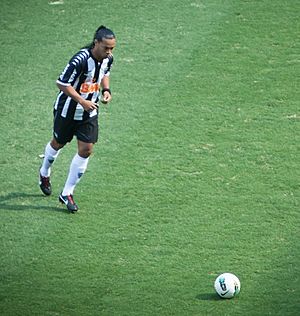
Comeback and International Glory (2010-2017)
The team won its 40th Campeonato Mineiro title in 2010. After a tough year in 2011, the arrival of Cuca as coach in late 2011 started a new successful period. The club moved back to the Independência stadium in 2012. They won the Campeonato Mineiro without losing a single game. The arrival of famous player Ronaldinho in the middle of 2012 was a big moment. The club finished second in the national league and earned a spot in the next year's Copa Libertadores.
In 2013, Diego Tardelli and Gilberto Silva returned to the club. They joined Ronaldinho, Jô, and Bernard to win another Campeonato Mineiro title. In the Copa Libertadores quarter-finals, Atlético's goalkeeper Victor made a crucial penalty save in injury time. Fans and commentators said this save helped the club overcome its past bad luck. Atlético then beat Newell's Old Boys and Olimpia in the finals, both on penalties, to win its first Copa Libertadores title. They then played in the 2013 FIFA Club World Cup but lost to Raja Casablanca, finishing third.
Under Levir Culpi, who returned in 2014, Atlético won its first Recopa Sudamericana, beating Lanús again in a continental final. In the 2014 Copa do Brasil, Atlético made amazing comebacks from being 0–3 down in both the quarter-finals and semi-finals. They then beat Cruzeiro in both final matches to win their first Copa do Brasil. The club's success continued in 2015, winning the Campeonato Mineiro and finishing second in the national league. In 2016, Atlético finished second in the state league and Copa do Brasil. They won their 44th Campeonato Mineiro title in 2017.
Recent Golden Age (2021–Present)
On December 2, 2021, Atlético won its third national league title after 49 years. They beat Bahia with a thrilling 3–2 comeback. Less than two weeks later, on December 15, they won their second Copa do Brasil trophy, beating Athletico Paranaense 4–0 at home and 2–1 away. On February 20, 2022, Atlético Mineiro won the 2022 Supercopa do Brasil title after a long penalty shootout against Flamengo. On April 7, 2024, Atlético won the 2024 Campeonato Mineiro for the fifth year in a row (2020–2024). This was only the third time in the club's history they achieved this feat.
Club Identity
Team Crest
The club's first emblem, from the 1910s, was simple. It had the letters "CAM" (for Clube Atlético Mineiro) in an oval shape. In 1922, they changed to a shield shape with the letters at the top and black and white stripes below. This shield design has stayed mostly the same since then. In the 1970s, a golden star was added above the badge to celebrate the 1971 national league title. This star is still there today.
Club Mascot
Atlético's mascot, a rooster, is very well known in Brazil. The nickname "rooster" was linked to Atlético because of their black and white uniforms. In 1945, a cartoonist named Fernando Pierucetti designed mascots for the biggest clubs in Belo Horizonte. He chose the rooster for Atlético because the team played with great passion and never gave up, like gamecocks.
Over time, "galo" became a popular chant and nickname for the club. This nickname was even put into the club's official song, written in 1968. In 1976, a person dressed as a rooster started appearing at games. This stadium mascot was brought back in 2005 with a new costume and named Galo Doido ("Crazy Rooster") by the fans.
Team Uniforms
Atlético's home uniform has always been a black-and-white striped shirt, black shorts, and white or black socks. The away uniform is usually all white. In 2000, an all-black third uniform was introduced. In 2008, a black-and-gold striped third uniform was made to celebrate the club's 100th birthday. The number 12 jersey is retired from the club's kits. It is dedicated to the fans, who are considered the "12th player."
Since 1981, sportswear companies have made the club's uniforms. The first was Rainha. Since 2017, Topper has made the kits. Many other companies like Adidas, Penalty, Umbro, Puma, and Dryworld have also made Atlético's uniforms.
In 1982, Credireal bank was Atlético's first shirt sponsor. Other sponsors over the years have included Precon, Agrimisa, Coca-Cola, TAM Airlines, Tenda, Fiat, Telemar, MRV Engenharia, BMG, and Caixa Econômica Federal.
Home Grounds and Training Facilities
Atlético's first home ground was built in 1912 in downtown Belo Horizonte. Their main stadium for many early years was the Presidente Antônio Carlos stadium, which held 5,000 people. It was one of the first stadiums in Brazil to have floodlights. It opened in 1929. This stadium was later sold in the 1960s.
Construction for the Independência stadium began in 1947 for the 1950 FIFA World Cup. It became Atlético's main stadium from 1950 to 1965. The stadium was renovated in 2012 and held 23,018 people. Atlético used it as their home ground for 10 years before moving back to the Mineirão in 2020.
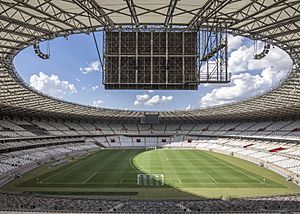
The Mineirão stadium opened in 1965 and quickly became Galo's new home. It could hold over 100,000 fans. The Mineirão was Atlético's home until it closed in 2010 for renovations for the 2014 FIFA World Cup. After the renovation, the Mineirão can hold 61,846 people.
Cidade do Galo ("Rooster City") is the club's main training facility since 2001. It is considered one of the best in the world. The Argentina national football team trained there during the 2014 FIFA World Cup. Other club facilities include Vila Olímpica ("Olympic Village"), an older training ground, and Labareda, a leisure club. In 2017, the club approved plans to build a new stadium, Arena MRV, in northeastern Belo Horizonte.
Club Supporters
Atlético Mineiro was founded by students from wealthy families, but it quickly welcomed players from all social classes. This made it known as a "people's club." Because of this wide support, the fans are known as "A Massa" (Portuguese for "the mass"). A 2014 survey showed that Atlético has the eighth largest fanbase in Brazil, with over five million supporters.
Atlético has many organized fan groups called torcidas organizadas. The oldest is Dragões da FAO, founded in 1969. The largest and most famous is Galoucura. Other groups include Galö Metal and Movimento 105 Minutos. The Charanga is a brass band that plays during home matches. After difficult but successful comebacks in 2013 and 2014, fans started using the motto "Eu acredito" ("I believe") to support the club in tough situations. The number 12 jersey is retired and dedicated to the fans.
Atlético has had the best average attendance in nine national league seasons since 1972. They also have the second highest total attendance in Brazilian football history. The second game of the 2013 Copa Libertadores Finals between Atlético and Olimpia had the highest ticket sales revenue ever in South American football.
In 1999, the club started giving out the Galo de Prata ("Silver Rooster") trophy. This award goes to athletes, famous supporters, artists, politicians, and groups who help promote the club's name. Since 2007, "Atleticano Day" is celebrated every year on March 25, the club's founding day. Atlético launched TV Galo in 2007, a TV channel for fans with interviews, training coverage, and news. Since 2012, the club has a program called Galo na Veia where supporters can get season tickets or discounted match tickets.
Club Rivalries
The local rivalry between Atlético and Cruzeiro is called the Clássico Mineiro ("Mineiro Derby"). It started in the 1940s and became the biggest derby in Minas Gerais in the 1960s. Atlético was stronger in the early years, but Cruzeiro became a strong competitor in the 1960s. The 1980s were good for Atlético, while the 1990s and 2000s were dominated by Cruzeiro. The 2010s saw both teams compete evenly. The 2020s have been good for Atlético, partly because Cruzeiro spent three years in the second division. Atlético has more wins in this derby. The only national final between the two clubs was in the 2014 Copa do Brasil, which Atlético won. The biggest win in the Clássico Mineiro was Atlético's 9–2 victory over Cruzeiro in 1927.
The derby between Atlético and América was known as the Clássico das Multidões ("Derby of the Masses"). América was stronger in the early years, winning ten state league titles in a row from 1916 to 1925. In the 1930s, Atlético became a professional club, while América resisted. From then on, Galo became the stronger team.
Atlético also has a rivalry with Flamengo from Rio de Janeiro. Their first match was in 1929. This rivalry grew in the 1980s because of many close and controversial games in national league and Copa Libertadores competitions. It is considered the biggest interstate rivalry in Brazilian football.
Club Records and Statistics
João Leite has played the most games for Atlético, with 684 matches. Reinaldo is the club's all-time top goalscorer, with 255 goals. In 1977, he scored 28 goals in 18 games, setting a club record for most national league goals in a season. Dadá Maravilha is second in total goals with 211. Argentine striker Lucas Pratto is Atlético's top foreign goalscorer with 41 goals. Telê Santana was Galo's longest-serving head coach, managing the team for 434 matches.
Atlético's first official game was against Yale in the 1915 Campeonato Mineiro, which they won 5–0. The club's biggest victory ever was 13–0 against Calafate in the 1927 Campeonato Mineiro. In the national league, their biggest win was 7–1 against Desportiva Ferroviária in 1982. Atlético's biggest win in the Copa do Brasil, 11–0 against Caiçara in 1991, is also a competition record.
The club's home attendance record (not counting rival games where fans are split) is 115,142, in a friendly against Flamengo in 1980. The record attendance for official matches is 113,749, in a game against Santos in the 1983 Brasileirão. Atlético holds the Brazilian record for the longest unbeaten run at home, with 54 matches from 2011 to 2013. The most expensive player bought by the club was André in 2012, costing about €8 million. The record sale was Bernard to Shakhtar Donetsk in 2013 for €25 million.
Club Organization and Finances
Like most Brazilian football clubs, Atlético Mineiro is a non-profit organization. The club is managed by a General Assembly, Deliberative Council, Board, Fiscal Council, and Ethics and Discipline Council. The General Assembly, made up of all members, elects the Deliberative Council every three years. This council then elects the club's Board, which manages the club. Fans who are season ticket holders or part of the Galo na Veia program are not full club members and cannot vote.
A study in 2016 showed that the club's brand was worth R$515.5 million (€143 million), making it the eighth most valuable in Brazil. In 2015, Atlético was seventh in the country for yearly earnings, making R$244.6 million (€62.2 million). The club has a main sponsorship deal with Caixa Econômica Federal.
Club Honours
Atlético Mineiro's first trophy was the Taça Bueno Brandão in 1914. The club was the first winner of the Campeonato Mineiro, which they have won a record 50 times. They have also won the Taça Minas Gerais five times. Nationally, Atlético has won the Campeonato Brasileiro Série A three times and the Copa do Brasil twice. They also won the Copa dos Campeões da Copa Brasil once.
In international competitions, Atlético has won the Copa Libertadores and the Recopa Sudamericana once each. They also won a record two Copa CONMEBOL trophies. The club has finished as runner-up in the Copa CONMEBOL, Copa de Oro, and Copa Master de CONMEBOL. They have played in the FIFA Club World Cup once, finishing third. The club's most recent title is the 2024 Campeonato Mineiro.
Official Tournament Wins
| Continental Titles | ||
|---|---|---|
| Competitions | Titles | Seasons |
| Copa Libertadores | 1 | 2013 |
| Recopa Sudamericana | 1 | 2014 |
| Copa CONMEBOL | 2 | 1992, 1997 |
| National Titles | ||
| Competitions | Titles | Seasons |
| Campeonato Brasileiro Série A | 3 | 1937, 1971, 2021 |
| Copa do Brasil | 2 | 2014, 2021 |
| Supercopa do Brasil | 1 | 2022 |
| Copa dos Campeões da Copa Brasil | 1 | 1978 |
| Campeonato Brasileiro Série B | 1 | 2006 |
| State Titles | ||
| Competitions | Titles | Seasons |
| Campeonato Mineiro | 50 | 1915, 1926, 1927, 1931, 1932, 1936, 1938, 1939, 1941, 1942, 1946, 1947, 1949, 1950, 1952, 1953, 1954, 1955, 1956, 1958, 1962, 1963, 1970, 1976, 1978, 1979, 1980, 1981, 1982, 1983, 1985, 1986, 1988, 1989, 1991, 1995, 1999, 2000, 2007, 2010, 2012, 2013, 2015, 2017, 2020, 2021, 2022, 2023, 2024, 2025 |
| Taça Minas Gerais | 5s | 1975, 1976, 1979, 1986, 1987 |
- record
- s shared record
Other Tournament Wins
International Friendly Tournaments
- Trofeo Conde de Fenosa (1): 1976
- Trofeo Cidade de Vigo (1): 1977
- Trofeo Costa del Sol (1): 1980
- Trofeo Villa de Bilbao (1): 1982
- Tournoi de Paris (1): 1982
- Bern Tournament (1): 1983
- Amsterdam Tournament (1): 1984
- Ramón de Carranza Trophy (1): 1990
- Copa Centenário de Belo Horizonte (1): 1997
- Three Continents Cup (1): 1999
- Florida Cup (1): 2016
National and Inter-state Friendly Tournaments
- Torneio Quadrangular de Colatina (1): 1953
- Torneio Quadrangular de Belo Horizonte (2): 1955, 1960
- Torneio Triangular de Franca (1): 1956
- Troféu Ivo Magalhães (1): 1963
- Torneio Cidade de Goiânia (1): 1970
- Torneio Cidade de São José dos Campos (1): 1970
- Taça Vitória-Minas (1): 1974
- Troféu Brasília 21 anos (1): 1981
- Troféu Osmar Santos (2): 2012, 2021
- Troféu João Saldanha (2): 2021, 2023
State Friendly Tournaments
- Taça Belo Horizonte (3): 1970, 1971, 1972
- Champions Cup (FMF) (1): 1974
- Torneio Incentivo Mineiro (1): 1993
- Torneio Início do Campeonato Mineiro (8): 1928, 1931, 1932, 1939, 1947, 1949, 1950, 1954
City Friendly Tournaments
- Taça Bueno Brandão (1): 1914
- Copa Belo Horizonte (1): 1959
Runner-up Finishes
- Copa Libertadores (1): 2024
- Copa CONMEBOL (1): 1995
- Copa de Oro (1): 1993
- Copa Masters CONMEBOL (1): 1996
- Campeonato Brasileiro Série A (5): 1977, 1980, 1999, 2012, 2015
- Copa do Brasil (2): 2016, 2024
- Primeira Liga (1): 2017
- Campeonato Mineiro (39): 1916, 1917, 1918, 1921, 1923, 1928, 1929, 1934, 1935, 1940, 1943, 1944, 1948, 1951, 1966, 1967, 1968, 1969, 1972, 1974, 1975, 1977, 1984, 1987, 1990, 1993, 1994, 1996, 1998, 2001, 2003, 2004, 2008, 2009, 2011, 2014, 2016, 2018, 2019
- Taça Minas Gerais (4): 1973, 1982, 1983, 1985
Youth Team Honours
- Campeonato Brasileiro Sub-20 (1): 2020
- Copa do Brasil Sub-20 (1): 2017
- Copa do Brasil Sub-17 (1): 2014
- Copa São Paulo de Futebol Júnior (3): 1975, 1976, 1983
- Supercopa São Paulo de Futebol Júnior (1): 1994
- Taça Belo Horizonte de Juniores (6): 1988, 1989, 2005, 2009, 2011, 2018
- Copa Santiago de Futebol Juvenil (1): 2006
Current Players
First Team Squad
|
|
Youth Players
|
|
Other Players Under Contract
|
Players Out on Loan
|
|
Club Management
Team Management Staff
Atlético Mineiro's coaching and medical staff are permanent members, except for the head coach and assistant coach.
| Position | Name |
|---|---|
| Head coach | |
| Director of football | |
| Football general manager | |
| Football supervisor | |
| Assistant coach | |
| Goalkeeping coach | |
| Fitness coach | |
| Performance analysis coordinator | |
| Performance analyst | |
| Medical director | |
| Doctor | |
| Physiotherapist | |
| Physiologist | |
| Nutritionist | |
| Psychologist | |
| Masseur | |
| Podiatrist | |
| Market coordinator | |
| Market analyst | |
| Press secretary | |
| Logistics manager | |
| Security chief | |
| Security supervisor | |
| Security guard | |
| Kit manager | |
| Storeroom assistant | |
| Field assistant | |
| Administrative analist | |
| Administrative assistant |
Last updated: 1 January 2025
Source: Comissão Técnica – Atlético
Club Board Members
The club's board started its term on January 2, 2024, and it will end on December 31, 2026.
| Position | Name |
|---|---|
| CEO | |
| Director of finance and administration | |
| Director of football | |
| Director of competitions | |
| Director of communications | |
| Medical director | |
| Director of operations | |
| Director of engineering | |
| Director of women's football | |
| President | |
| Vice-president | |
| General director | |
| Director of institutional relations | |
| Labareda director | |
| Vila Olímpica director |
Other Sports at Atlético Mineiro
Futsal (Indoor Football)
Atlético Mineiro started its futsal (indoor football) department in the 1960s. They won state titles and the Taça Brasil in 1985. In the late 1990s, the team, called Atlético Pax de Minas, was very strong nationally and internationally. With players like Manoel Tobias, Falcão, and Lenísio, Atlético won the Brazilian Liga Futsal twice (1997 and 1999) and the Intercontinental Futsal Cup in 1998. In 1999, a game had 25,713 fans, a world record for futsal. The professional futsal team stopped playing in 2001, and the entire futsal department closed in 2009.
American Football
In March 2018, the club announced a new American football team called Galo Futebol Americano. In its first season in Brazil's American football league, the team won all its games, including the Brasil Bowl.
Olympic Sports
Atlético Mineiro also had departments for other Olympic sports in the past, especially athletics and volleyball. In 1983, runner João da Mata won the São Silvestre road race as an Atlético athlete. In 2007, Robert Kipkoech Cheruiyot and Alice Timbilil won the same race and celebrated with Atlético flags. The club's men's volleyball team won the Minas Gerais Volleyball Championship 12 times.
See also
 In Spanish: Clube Atlético Mineiro para niños
In Spanish: Clube Atlético Mineiro para niños
- Clube Atlético Mineiro (women)
- Clube Atlético Mineiro (youth)
- Football in Brazil
 | William L. Dawson |
 | W. E. B. Du Bois |
 | Harry Belafonte |


